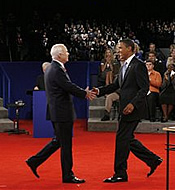VOA标准英语10月-Obama, McCain Clash on Foreign Security Prioritie(在线收听)
 |
| Democratic presidential candidate Sen. Barack Obama, D-Ill.,(R) and Republican presidential candidate Sen. John McCain, R-Ariz., shake hands before the start of the town hall-style presidential debate in Nashville, Tenn., 08 Oct 2008 |
The two major presidential candidates used sharp criticism of each other to defend their positions on the war in Iraq, and nuclear threats posed by Iran and North Korea. The town hall debate in Nashville allowed Senator McCain a chance to renew his support for U.S. military forces in Iraq, while Senator Obama repeated his opposition to the war.
McCain said his military and Senate experience have well prepared him to face tough decisions, more so than his opponent.
"My judgement is a record I am willing to stand on. Senator Obama was wrong on Iraq and the surge. He was wrong about Russia when it committed aggression against Georgia. And in his short career he does not understand our national security challenges," said McCain. "You would not have time for on the job training, my friend."
Obama attacked McCain for supporting the war in Iraq and his proposal to keep U.S. troops in the country until security conditions change. He said his opponent has been wrong from the start.
"Senator McCain was cheer-leading the president to go into Iraq. He suggested it was going to be quick and easy. He said we were going to be greeted as liberators," said Obama. "That was the wrong judgment, and it has been costly to us."
Obama said the continued military effort in Iraq has distracted from major security challenges in Afghanistan and Pakistan. He also accused McCain of being too supportive of possible military strikes on Iran and North Korea.
"This is the guy who sang 'bomb bomb Iran,' who called for the annihilation of North Korea," he said. "That is not an example of speaking softly."
McCain said his approach to foreign security issues is to speak softly and carry a big stick, echoing the words of former U.S. president Teddy Roosevelt. He said a tough stance is needed especially with Russia.
"Ukraine right now is in the sights of Vladimir Putin, and those who want to reassemble the old Soviet Union," he said. "We have got to show moral support for Georgia, we have go to show moral support for Ukraine. We have got to advocate for their membership in NATO."
Obama said U.S. support and financial aid should extend to other former Soviet areas, such as Latvia, Estonia and Poland.
"We have also got to provide them with financial and concrete assistance to help them rebuild their economies," he said. "Georgia is on the brink of enormous economic challenges. Some say that is what Putin intended in the first place."
Both candidates agreed that Iran and the continuation of its nuclear program pose serious challenges to the United States and the country's next president.
McCain said he would lead multilateral efforts to prevent Iran from acquiring nuclear weapons.
"I want to make sure we put enough pressure on the Iranians, by joining with our allies, imposing significant, tough sanctions to modify their behavior," McCain said.
Obama also said he supports a variety of international sanctions against Iran. But he broke with Senator McCain and President Bush, in saying he does not oppose direct talks with Iran and North Korea.
"When President Bush decided we are not going to talk to Iran, we are not going to talk to North Korea, you know what happened? Iran went from zero centrifuges to develop nuclear weapons to 4,000," said Obama. "North Korea quadrupled its nuclear capability."
Senator McCain has repeatedly criticized Obama for his openness to meeting with the leaders of Iran, North Korea and other hostile nations.
In less than a month, U.S. voters will decide which candidate will take over those security and foreign policy issues.